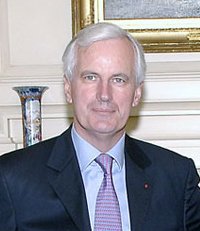The business community has given a largely warm response to the announcement of an agreement on a 20-month, Brexit transitional period but warn that there is still much to agree on the detail of the UK’s departure from the European Union.
Negotiators David Davis, for the UK, and the EU's Michel Barnier, described the accord, designed to allow the UK to leave the EU in an orderly manner, as a "decisive step" in the Brexit process.
The deal, which could be ratified by UK Prime Minister Theresa May and European leaders at an EU summit this week, allows the UK to negotiate and sign trade deals during the transition period and builds in the rights of the EU citizens in the UK and UK citizens in the EU after Brexit, media reports said.
However, its adoption is conditional on a broader agreement on the UK pulling out of the EU withdrawal, which is scheduled to be finalized later year and where one of the main sticking points has been the border between Northern Ireland, which is part of the UK, and Ireland, which will remain in the European Union.
The transitional period is scheduled to run from March 29, 2019 (the date of Brexit) to December 2020, and is designed to not only smooth the path to a future permanent relationship between the UK and the EU but to give firms time to adapt to the new trading arrangements.
The UK's Freight Transport Association (FTA) expressed “welcome relief” that a deal had been reached on a Brexit transition period but underlined that the EU's “nothing is agreed until all is agreed” principle still left logistics operators uncertain over the future.
Contacted by CEP-Research, UPS said in a brief statement that having a transitional period “provides greater stability and certainty for businesses in the UK and across Europe.”
It added: “Providing a period for businesses and governments to prepare for changes such as the customs procedures on shipments between the UK and EU-27 (member states) is in everyone’s best interest. The UK is a significant market for UPS, not just in Europe but globally, and we are continuing to invest there.”
In November last year came news that UPS was planning to invest more than £100 million in the construction of a new UK parcel hub near East Midlands Airport (EMA) which could create over 1,000 jobs.
For its part, DHL is “paying close attention to the (Brexit) process and constantly analyze it with a view to our services, and accompany it with our expertise towards the relevant stakeholders.”
The statement continued: “Even if the future framework for EU-UK trade is not yet clear, we can assure our customers that we are already preparing ourselves internally as much as possible and are happy to support them with our advice.
It added: “Through its global activity, Deutsche Post DHL Group is used to dealing with a wide variety of trade barriers and obstacles. Likewise, adapting to changing conditions is one of the daily challenges of our business.
“Against this background, we are convinced that, even after UK’s withdrawal from the European Union, we will – where necessary – be very quickly able to develop and implement new solutions for and with our customers. Our customers will continuously benefit from our high level of expertise in dealing with various customs regimes. Thus, we will further be the enabler of cross-border trade for our customers.”
As for other CEP players, Royal Mail declined to respond to questions on the subject but FedEx told CEP-Research that it has set up a cross-functional working group “to monitor developments, assess the transition agreement and to enable us to adapt to any changes in a timely manner. To keep abreast of any developments, we are also engaged in on-going discussions with the government at various levels through our active membership of trade associations.”
It added: “FedEx has been a long-standing supporter of international trade agreements and as a result will support any potential preferential trade deals between the UK and Europe to open up markets and benefit customers."
The FTA's Deputy CEO, James Hookham, said a Brexit transitional period was “positive news for British business,” before adding: “But there is still a huge amount of technical agreement required to ensure that trade can continue to move between the UK and the European Union with as few delays as possible, if industry and businesses are not to be left with huge breaks in their supply chains, at the end of the transition period.
“We seem to be getting more time to agree the new border procedures and there is some confidence that UK employers will be able to continue to employ EU nationals up until the end of the transition and beyond, as long as those are permanent residents in the UK or frontier workers.”
Hookham concluded: “But business still needs to know what customs and trade procedures look like after the transition period: the customs duties and taxes, the formalities required in the UK and the arrangements for border inspections of goods, the number of trucks that will be allowed to cross the border and the arrangements for the recognition of drivers’ licences and qualifications.
“Clarification in these two areas is a good start but we are still a long way from achieving low friction trade after Brexit The transition period is welcome but it still leaves a lot for government and industry to achieve in an incredibly short space of time.”












